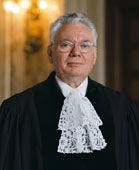Judge Thomas Buergenthal LL.M. ’61 S.J.D. ’68 and Jerome Shestack ’49 are co-recipients of the Gruber Foundation’s International Justice Prize for 2008. The prize is presented to individuals or organizations for advancing the cause of justice in the legal system and carries a $500K award, which the two recipients will share.
 The American judge on the International Court of Justice, Buergenthal was cited for his lengthy career spent championing human rights. While a judge and president of the Inter-American Court of Human Rights, he helped put an end to the practice of disappearances in Honduras and helped to secure the government of Guatemala’s compliance with a Court order ending executions of human rights activists by special tribunals. Buergenthal has also held posts on the Inter-American Development Bank, the UN Truth Commissions for El Salvador, and the UN Human Rights Committee.
The American judge on the International Court of Justice, Buergenthal was cited for his lengthy career spent championing human rights. While a judge and president of the Inter-American Court of Human Rights, he helped put an end to the practice of disappearances in Honduras and helped to secure the government of Guatemala’s compliance with a Court order ending executions of human rights activists by special tribunals. Buergenthal has also held posts on the Inter-American Development Bank, the UN Truth Commissions for El Salvador, and the UN Human Rights Committee.
Prior to his appointment to the ICJ in 2000, Buergenthal was the Lobingier Professor of International and Comparative Law and Jurisprudence at the George Washington University Law School. He is the author of more than a dozen books and a large number of articles on international law, human rights, and comparative law, including co-authoring the first human rights law textbook in the U.S.
A former president of the American Bar Association, Shestack helped end the practice of disappearances in Argentina, Chile, and Brazil as U.S. ambassador to the UN Commission on Human Rights. He chaired the International League for Human Rights and founded and chaired the Lawyers Committee for International Human Rights. Currently at Wolf Block in Philadelphia, Shestack is often called the “Pied Piper of Human Rights” for the time he has spent serving as a mentor to young lawyers.
Shestack has also championed human rights and equality in the U.S. While still a student at HLS, Shestack launched a movement to have women admitted to the school. As a faculty member at LSU in the early 1950s, he led a successful campaign to desegregate the school. And, as first deputy city solicitor of Phildelphia, he helped to end segregation in swimming pools, bowling alleys, and other public places. He is the author of more than 100 scholarly articles published in law journals and other publications.
